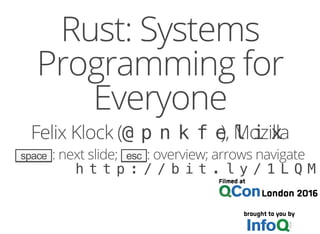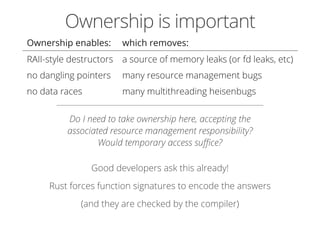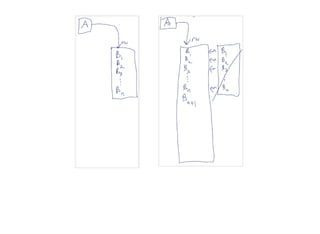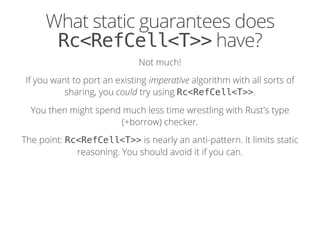The document discusses Rust, a systems programming language sponsored by Mozilla, highlighting its benefits such as fast performance, memory safety, and the elimination of segmentation faults and data races. It details Rust's 1.0 release in May 2015, its open-source model, and the active developer community. Additionally, it features demonstrations of Rust's ownership model, along with concurrent programming examples that showcase its capabilities in managing memory and ensuring safety.











![Demo: sequential web page fetch
fn sequential_web_fetch() {
use hyper::{self, Client};
use std::io::Read; // pulls in `chars` method
let sites = &["http://www.eff.org/", "http://rust-lang.org/",
"http://imgur.com", "http://mozilla.org"];
for &site in sites { // step through the array...
let client = Client::new();
let res = client.get(site).send().unwrap();
assert_eq!(res.status, hyper::Ok);
let char_count = res.chars().count();
println!("site: {} chars: {}", site, char_count);
}
}
(lets get rid of the Rust-specific pattern binding in for; this is not a
tutorial)](https://image.slidesharecdn.com/untitled-160627143327/85/Rust-Systems-Programming-for-Everyone-12-320.jpg)
![Demo: sequential web page fetch
fn sequential_web_fetch() {
use hyper::{self, Client};
use std::io::Read; // pulls in `chars` method
let sites = &["http://www.eff.org/", "http://rust-lang.org/",
"http://imgur.com", "http://mozilla.org"];
for site_ref in sites { // step through the array...
let site = *site_ref; // (separated for expository purposes)
{ // (and a separate block, again for expository purposes)
let client = Client::new();
let res = client.get(site).send().unwrap();
assert_eq!(res.status, hyper::Ok);
let char_count = res.chars().count();
println!("site: {} chars: {}", site, char_count);
}
}
}](https://image.slidesharecdn.com/untitled-160627143327/85/Rust-Systems-Programming-for-Everyone-13-320.jpg)
![Demo: concurrent web page fetch
fn concurrent_web_fetch() -> Vec<::std::thread::JoinHandle<()>> {
use hyper::{self, Client};
use std::io::Read; // pulls in `chars` method
let sites = &["http://www.eff.org/", "http://rust-lang.org/",
"http://imgur.com", "http://mozilla.org"];
let mut handles = Vec::new();
for site_ref in sites {
let site = *site_ref;
let handle = ::std::thread::spawn(move || {
// block code put in closure: ~~~~~~~
let client = Client::new();
let res = client.get(site).send().unwrap();
assert_eq!(res.status, hyper::Ok);
let char_count = res.chars().count();
println!("site: {} chars: {}", site, char_count);
});
handles.push(handle);
}
return handles;
}](https://image.slidesharecdn.com/untitled-160627143327/85/Rust-Systems-Programming-for-Everyone-14-320.jpg)


![Demo: soundness I
fn sequential_web_fetch_2() {
use hyper::{self, Client};
use std::io::Read; // pulls in `chars` method
let sites = &["http://www.eff.org/", "http://rust-lang.org/",
// ~~~~~ `sites`, an array (slice) of strings, is stack-local
"http://imgur.com", "http://mozilla.org"];
for site_ref in sites {
// ~~~~~~~~ `site_ref` is a *reference to* elem of array.
let client = Client::new();
let res = client.get(*site_ref).send().unwrap();
// moved deref here ~~~~~~~~~
assert_eq!(res.status, hyper::Ok);
let char_count = res.chars().count();
println!("site: {} chars: {}", site_ref, char_count);
}
}](https://image.slidesharecdn.com/untitled-160627143327/85/Rust-Systems-Programming-for-Everyone-17-320.jpg)
![Demo: soundness II
fn concurrent_web_fetch_2() -> Vec<::std::thread::JoinHandle<()>> {
use hyper::{self, Client};
use std::io::Read; // pulls in `chars` method
let sites = &["http://www.eff.org/", "http://rust-lang.org/",
// ~~~~~ `sites`, an array (slice) of strings, is stack-local
"http://imgur.com", "http://mozilla.org"];
let mut handles = Vec::new();
for site_ref in sites {
// ~~~~~~~~ `site_ref` still a *reference* into an array
let handle = ::std::thread::spawn(move || {
let client = Client::new();
let res = client.get(*site_ref).send().unwrap();
// moved deref here ~~~~~~~~~
assert_eq!(res.status, hyper::Ok);
let char_count = res.chars().count();
println!("site: {} chars: {}", site_ref, char_count);
// Q: will `sites` array still be around when above runs?
});
handles.push(handle);
}
return handles;
}](https://image.slidesharecdn.com/untitled-160627143327/85/Rust-Systems-Programming-for-Everyone-18-320.jpg)











![Rust types
Move Copy Copy if T:Copy
Vec<T>, String, ... i32, char, ... [T; n], (T1,T2,T3), ...
struct Car { color: Color, engine: Engine }
fn demo_ownership() {
let mut used_car: Car = Car { color: Color::Red,
engine: Engine::BrokenV8 };
let apartments = ApartmentBuilding::new();
references to data (&mut T, &T):
let my_home: &Home; // <-- an "immutable" borrow
let christine: &mut Car; // <-- a "mutable" borrow
my_home = &apartments[6]; // (read `mut` as "exclusive")
let neighbors_home = &apartments[5];
christine = &mut used_car;
christine.engine = Engine::VintageV8;
}](https://image.slidesharecdn.com/untitled-160627143327/85/Rust-Systems-Programming-for-Everyone-30-320.jpg)





![read_only_borrows[2] = &christine;
read_only_borrows[3] = &christine;
read_only_borrows[4] = &christine;
many inspectors (immutable borrows)](https://image.slidesharecdn.com/untitled-160627143327/85/Rust-Systems-Programming-for-Everyone-36-320.jpg)



![read_only_borrows[2] = &christine;
let mutable_borrow = &mut christine;
read_only_borrows[3] = &christine;
// ⇒ CHAOS!
mixing mutable and immutable is illegal](https://image.slidesharecdn.com/untitled-160627143327/85/Rust-Systems-Programming-for-Everyone-40-320.jpg)



















![Immutable borrowed slices
let mut a = Vec::new();
for i in 0..n { a.push(B::new()); }
let r1 = &a[0..3];
let r2 = &a[7..n-4];
mutiple borrowed slices vec
(ahas only read capability now; shares it with r1and r2)](https://image.slidesharecdn.com/untitled-160627143327/85/Rust-Systems-Programming-for-Everyone-60-320.jpg)
![Safe overlap between &[..]
let mut a = Vec::new();
for i in 0..n { a.push(B::new()); }
let r1 = &a[0..7];
let r2 = &a[3..n-4];
overlapping slices](https://image.slidesharecdn.com/untitled-160627143327/85/Rust-Systems-Programming-for-Everyone-61-320.jpg)

![Mutable slice of whole vec
let w = &mut a[0..n];
mutable slice of vec
(ahas no capabilities; wnow has read and write capability)](https://image.slidesharecdn.com/untitled-160627143327/85/Rust-Systems-Programming-for-Everyone-63-320.jpg)















![std::thread
fn concurrent_web_fetch() -> Vec<::std::thread::JoinHandle<()>> {
use hyper::{self, Client};
use std::io::Read; // pulls in `chars` method
let sites = &["http://www.eff.org/", "http://rust-lang.org/",
"http://imgur.com", "http://mozilla.org"];
let mut handles = Vec::new();
for site_ref in sites {
let site = *site_ref;
let handle = ::std::thread::spawn(move || {
// block code put in closure: ~~~~~~~
let client = Client::new();
let res = client.get(site).send().unwrap();
assert_eq!(res.status, hyper::Ok);
let char_count = res.chars().count();
println!("site: {} chars: {}", site, char_count);
});
handles.push(handle);
}
return handles;
}](https://image.slidesharecdn.com/untitled-160627143327/85/Rust-Systems-Programming-for-Everyone-79-320.jpg)
![dispatch
fn concurrent_gcd_fetch() -> Vec<::dispatch::Queue> {
use hyper::{self, Client};
use std::io::Read; // pulls in `chars` method
use dispatch::{Queue, QueueAttribute};
let sites = &["http://www.eff.org/", "http://rust-lang.org/",
"http://imgur.com", "http://mozilla.org"];
let mut queues = Vec::new();
for site_ref in sites {
let site = *site_ref;
let q = Queue::create("qcon2016", QueueAttribute::Serial);
q.async(move || {
let client = Client::new();
let res = client.get(site).send().unwrap();
assert_eq!(res.status, hyper::Ok);
let char_count = res.chars().count();
println!("site: {} chars: {}", site, char_count);
});
queues.push(q);
}
return queues;
}](https://image.slidesharecdn.com/untitled-160627143327/85/Rust-Systems-Programming-for-Everyone-80-320.jpg)




![scoped threading?
std::theaddoes not allow sharing stack-local data
fn std_thread_fail() {
let array: [u32; 3] = [1, 2, 3];
for i in &array {
::std::thread::spawn(|| {
println!("element: {}", i);
});
}
}
error: `array` does not live long enough](https://image.slidesharecdn.com/untitled-160627143327/85/Rust-Systems-Programming-for-Everyone-85-320.jpg)
![crossbeamscoped threading
fn crossbeam_demo() {
let array = [1, 2, 3];
::crossbeam::scope(|scope| {
for i in &array {
scope.spawn(move || {
println!("element: {}", i);
});
}
});
}
::crossbeam::scopeenforces parent thread joins on all spawned
children before returning
ensures that it is sound for children to access local references
passed into them.](https://image.slidesharecdn.com/untitled-160627143327/85/Rust-Systems-Programming-for-Everyone-86-320.jpg)


![rayondemo 1: map reduce
Sequential
fn demo_map_reduce_seq(stores: &[Store], list: Groceries) -> u32 {
let total_price = stores.iter()
.map(|store| store.compute_price(&list))
.sum();
return total_price;
}
Parallel (potentially)
fn demo_map_reduce_par(stores: &[Store], list: Groceries) -> u32 {
let total_price = stores.par_iter()
.map(|store| store.compute_price(&list))
.sum();
return total_price;
}](https://image.slidesharecdn.com/untitled-160627143327/85/Rust-Systems-Programming-for-Everyone-89-320.jpg)

![rayondemo 2: quicksort
fn quick_sort<T:PartialOrd+Send>(v: &mut [T]) {
if v.len() > 1 {
let mid = partition(v);
let (lo, hi) = v.split_at_mut(mid);
rayon::join(|| quick_sort(lo),
|| quick_sort(hi));
}
}
fn partition<T:PartialOrd+Send>(v: &mut [T]) -> usize {
// see https://en.wikipedia.org/wiki/
// Quicksort#Lomuto_partition_scheme
...
}](https://image.slidesharecdn.com/untitled-160627143327/85/Rust-Systems-Programming-for-Everyone-91-320.jpg)
![rayondemo 3: buggy quicksort
fn quick_sort<T:PartialOrd+Send>(v: &mut [T]) {
if v.len() > 1 {
let mid = partition(v);
let (lo, hi) = v.split_at_mut(mid);
rayon::join(|| quick_sort(lo),
|| quick_sort(hi));
}
}
fn quick_sort<T:PartialOrd+Send>(v: &mut [T]) {
if v.len() > 1 {
let mid = partition(v);
let (lo, hi) = v.split_at_mut(mid);
rayon::join(|| quick_sort(lo),
|| quick_sort(lo));
// ~~ data race!
}
}
(See blog post "Rayon: Data Parallelism in Rust" bit.ly/1IZcku4)](https://image.slidesharecdn.com/untitled-160627143327/85/Rust-Systems-Programming-for-Everyone-92-320.jpg)

















![Interop
Rust to C
easy: extern { ... }and unsafe { ... }
C to Rust
easy: #[no_mangle] extern "C" fn foo(...) { ... }
Ruby, Python, etc to Rust
see e.g. https://github.com/wycats/rust-bridge](https://image.slidesharecdn.com/untitled-160627143327/85/Rust-Systems-Programming-for-Everyone-110-320.jpg)





